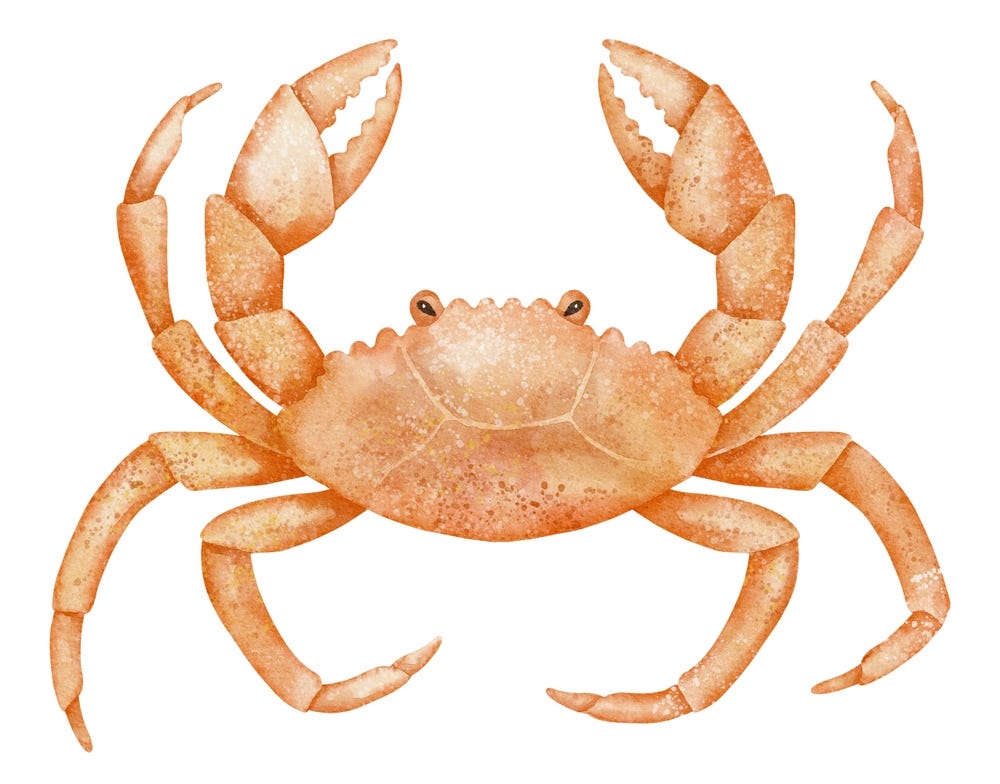“It is very simple to be happy, but it is very difficult to be simple.”
- Rabindranath Tagore
I’ve been thinking this week about decorator crabs.
To protect themselves from predators, these ingenious crabs embellish their shells with little bits of the flora and fauna they find around them: algae and other plants, sponges, anemones - whatever their environment offers.
They attach all these extra bits to their backs with tiny little hooks that grow on their shells, kind of like natural Velcro.
By adorning themselves with all this extra, decorator crabs simultaneously win points for flamboyant creativity and for totally blending in. Because their decorations are made from their environment, predators can’t see where the crab ends and the world around them begins.
Obviously, these are fabulous creatures with an incredibly successful strategy for using over-the-top outfits as a means of staying alive. But are they good role models for us as creators?
Can you relate?
None of us get out of childhood without learning how to adhere little bits of decorative camouflage over our simple surfaces. Early on, we stick on manners and costumes for family and teachers, then grades and degrees, and later job titles, pinning them just so to cover over our blemishes and rough spots. Over time, we may flirt with clothes and jewelry, trendy haircuts and makeup. We borrow language from people we admire, and graft on ideas that make us look good.
We cover ourselves with elements that feel like they will make us cooler, cleverer, and more beautiful, and, at the same time, more acceptable, more like the others.
To be fair, there are many good reasons to “armor up.” Unlike decorator crabs, most of us aren’t being hunted for food by octopi and fish, but there are nonetheless real threats to our psychological and cultural well-being that we are wise to protect ourselves from. Belonging is a powerful pull, and exile is a painful, lonely experience.
As artists, we are not immune
I suspect that many of us creators hold a sense that we are somewhat immune to decorator crab impulses. Many of us think of ourselves as non-conformists, and our drives for authenticity and self-determination (not to mention our tendency to hover low on the economic food chain) all lean us toward disdain for the fancy adornments and fakery to which our culture teaches us to aspire. Not for us the plumpers and fillers and other false faces!
And yet, even the most consumption-averse among our tribe can relate in some way to the decorator crab strategy. A few of us decorate our physical selves wildly and performatively, but even more of us (me included) find ourselves channeling our inner decorator crab by overthinking and over-embellishing our work.
We channel our inner decorator crabs when we habitually do too much, embellishing and overworking our projects, fearing that our ideas (or we) are too simple, too dull, too plain, too obvious, or too small.
Peeling Back the Shine
Perhaps it is an effect of my advancing age, or a result of living amongst the hyper-casual mostly-unpretentious population of a rural island for 20 years, or maybe it’s the fraud-filled context of these times, but I find myself recoiling more and more lately from pretense and puffery.
My disgust manifests itself in episodes of wild rage, not only at the obvious lies and gaslighting of the current political regime, but also by the AI babies performing famous movie scenes in my Instagram reels, and by Anne Hathaway’s recent plastic surgery (see Met Gala 2025).
Like never before, I crave the honest, the genuine, and the true. Everything else is pissing me off.
When I bring this deep eagerness for honesty to the ground of my own life and work, my own decorator crab tendencies to cover my perceived inadequacies with add-ons and extras become glaringly apparent.
I’m noticing how my habit of imagining the most critical possible audience for my work leads me to defend against anticipated judgment by adding a bit more here or there - just another layer to extend a thought, or another idea tucked in just so, hoping to demonstrate that I’m a little smarter or more interesting than I fear I actually am.
I sense that it is time to deepen my practice of trusting my ideas to speak for themselves, doing less to plump them up, and getting more out of the way. I want to practice letting go of some of the decorations and the extras and allow myself to be seen for my brilliantly simple crabby self.
Your Invitation This Week
This week, let’s play around and see what happens if we choose to show up plain.
Let’s take look around our lives with an eye to spotting any layers we’ve accrued that now feel false.
(Maybe your inner decorator crab has a habit of overworking your paintings? Or pretending to like movies or books or foods that you really don’t like? Or a tendency to edit all the life out of your writing? Or a habit of not showing up because you don’t feel you are good enough? Or a habit of over-performing as a cover for your simple self?)
What if this week all we have to do is show up plain and tell the truth?
To be clear: I’m not talking about deshelling ourselves! This is not a call for engaging in a style of performative “vulnerability” that involves baring your most sensitive parts. You deserve as much privacy as you need to feel safe and free.
I AM talking about dropping some of your habits of embellishment and trusting others to love the real shape of you.
I’m talking about seeking to create from a place of honesty.
I’m talking about playing with the possibility of being a little bit less of what you are not.
I’m interested in peeling back the accumulated layers of camouflage so that we can see to the simple crab underneath.
What is the real shape of you?
What is the real shape of the idea you are trying to express, underneath any “extra” layers designed to cover those places where you feel inadequate or unlovable?
Can you celebrate the roughly textured enoughness of your nature?
My working hypothesis is that we’ll find that the people who love us and our work have loved us all this time DESPITE our adornments, not because of them.
Are we brave enough to test that theory?
I’d love to hear what showing up plain might look like to you.







Yes, I relate to being preoccupied by the thought of sharing - > "Belonging is a powerful pull, and exile is a painful, lonely experience." And I appreciate the invitation to show up authentically with an open heart!! Thank you Sara!
I love this one too Sara! Your invitations give such meaty food for thought.
And I don't want to be the devil's advocate (okay that s decorative. I d love to be devil s advocate), but as complex creators are the decorative layers not also elements in conversation with the whole?
I think there is a chance the decarative means more than meets the eye.